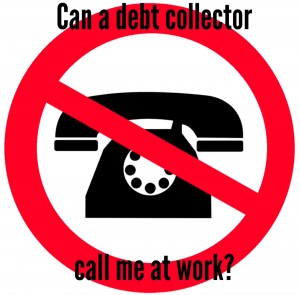By:Â Robert J. Nahoum
THE PROBLEM:
Times are tough for you as they are for so many of us these days. You’ve fallen behind on bills and the debt collectors have been after you. You get regular letters in the mail and your phone rings all the time. Now, you’re getting those calls at work. Even worse, the debt collectors are speaking with your co-workers and even your boss.
THE RULE:
Federal debt collection laws, known as the Fair Debt Collection Practices Act (FDCPA for short), regulates the collection of consumer debts. The FDCPA prohibits debt collectors from using false, misleading and harassing debt collection tactics.
The FDCPA, explicitly prohibits a debt collector from contacting you at work if it knows or has reason to know that such calls are not allowed. So if you have previously told the debt collector (in writing or orally) that you are not allowed to receive calls from them at work, they are prohibited from calling you there again.
Even if you are allowed to receive debt collection calls at work, continued calls may still violate the FDCPA. The FDCPA generally prohibits “any conduct the natural consequence of which is to harass, oppress, or abuse any person in connection with the collection of a debt.â€Â So, if the natural consequence of calls to you at work is to harass, oppress or abuse you, such calls are prohibited.
What about those calls to your co-workers? The FDCPA prohibits communications to any third parties (anyone other than you) except for the sole purpose of confirming your address, home phone number and where you work. Also, debt collectors are usually are prohibited from making this kind of call more than once. Other than to obtain this location information, debt collectors are generally prohibited from discussing your debt with anyone other than you, your spouse, or your attorney.
WHAT YOU SHOULD DO:
If a debt collector is calling you at work, tell them that it is not ok to call you there. While it is not required, put your demand that they stop the calls in writing so that you have proof. If the calls continue or if the debt collector is talking to your co-workers, you should contact an experienced consumer protection lawyer and see if you have a case.
The FDCPA includes a private right of action under which a consumer may sue a debt collector for FDCPA violations. If a debt collector is found to have violated the FDCPA, you may recover up to $1,000.00 in statutory damages, plus actual damages (for example pain and suffering) and your reasonable attorneys’ fees.
The FDCPA empowers the consumer to swing the pendulum in the other direction and sue the debt collector for its wrongful conduct.
If you need help settling or defending a debt collection law suit, stopping harassing debt collectors or suing a debt collector, contact us today to see what we can do for you.
The Law Offices of Robert J. Nahoum, P.C
(845) 232-0202
www.nahoumlaw.com
info@nahoumlaw.com

